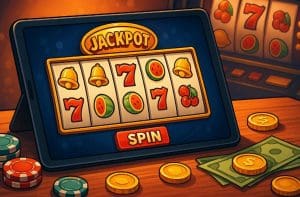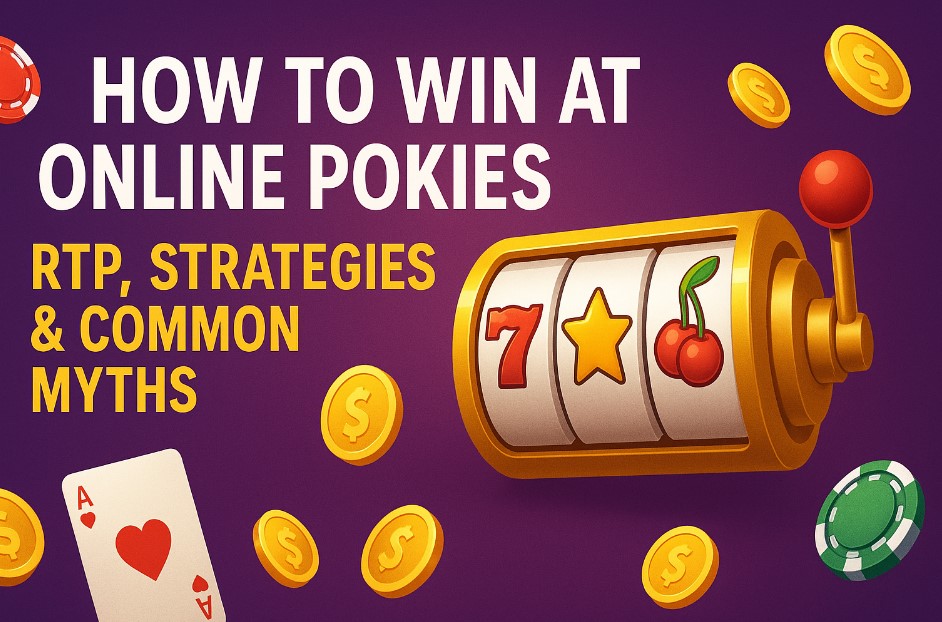Online pokies have this funny way of turning a “quick session” into a full-on emotional arc. One moment you’re casually spinning after dinner, the next you’re leaning forward like you’re about to defuse a bomb because a scatter symbol just drifted onto the fourth reel. I once watched a mate freeze mid-sip of his coffee because he thought a wild was about to land and complete a jackpot line. It didn’t — but the suspense alone nearly made him choke.
Moments like that are why people love pokies, but they’re also why myths and wild theories spread faster than common sense. If you’re going to play — especially online pokies with all their features, multipliers and shiny animations — understanding the mechanics helps far more than any superstition.
A smarter player still can’t force wins, but they absolutely can make choices that influence long-term results, slow bankroll burn, and avoid those spirals where you chase losses and feel your stomach do a little backflip. Let’s walk through the things that actually matter, the things that people believe matter, and the places where players unknowingly sabotage themselves.
The Real Reason RTP Matters More Than Players Think
RTP (return to player) is one of those terms people pretend to understand but secretly don’t. A friend once said, “Nah mate, RTP doesn’t matter — I’ve won more on 92 percent games than on the high ones.” And sure, he wasn’t wrong about his single experience. It’s just… statistically meaningless.
RTP works in the long, long run. Think hundreds of thousands of spins, not your weekend session. A 96 percent RTP game isn’t promising you a refund with a bow on top. It’s promising that, over a vast sample, players collectively get back around 96 percent of what they wager.
In your actual playing life, the benefit shows up like this:
- you lose slower
- your bankroll stretches longer
- you survive droughts more comfortably
But here’s the thing nobody says out loud: RTP doesn’t change the feeling of a game. You might swear a low-RTP pokie is “lucky” because you once hit something big, but if you stick with it long enough, the maths quietly catches up.
Some providers are known for stable, player-friendly percentages — Microgaming, NetEnt and Big Time Gaming often hover near that sweet mid-nineties zone. Meanwhile, there are pokies out there with RTP so low that you can almost hear your bankroll sizzling.
Volatility: The Mood Swings Behind Every Slot Session
Volatility is practically the personality of the pokie. Low volatility feels like chatting with a friendly barista — small, consistent, nothing too wild. High volatility feels more like catching a bus in the rain: totally unpredictable with rare moments of joy.
I once tried a high-volatility Megaways game on a tiny bankroll just to “test the waters”. Five minutes later my wallet looked like it evaporated. Lesson learned.
Here’s how volatility secretly shapes your experience:
- Low volatility: lots of small hits, stable sessions, fewer surprises.
- High volatility: long quiet patches, then BOOM — a feature that pays ten times your bet.
Neither is “better”. It’s more like choosing between chill and unpredictable. Matching volatility to your bankroll and personality saves you from unnecessary frustration. If you’re easily rattled by dry spells, trust me, high-volatility era might not be your best match.
Choosing Pokies That Actually Give You a Chance
People pick pokies like they pick takeaway — whatever looks fun at the moment. But if you’re trying to stretch your money or angle for better odds, your selection habits matter.
A lot of seasoned players (myself included) have been burned by gorgeous, cinematic pokies with paytables so unforgiving they might as well whisper “good luck, champ” while taking your money. Nowadays I always peek at the paytable before spinning. It’s like skimming a restaurant menu before ordering so you don’t accidentally pick the $48 salad.
You’ll spot all kinds of things:
- multiplier caps
- how wilds behave
- scatter payouts
- what triggers the bonus game
- whether the top symbols are actually worth the chase
You can immediately tell whether the pokie rewards base game hits, relies entirely on features, or mixes the two. If you’re playing a game where only the bonus round pays decently, be ready for long stretches of anticipation.
Bankroll Talk: The Part Everyone Knows But Few Actually Follow
Let’s be honest: bankroll rules are the vegetables of gambling advice. Everyone nods politely then ignores them the moment a tempting feature pops up.
But bankroll is the thing that decides whether you’re enjoying yourself or panicking. I’ve had sessions where I felt totally in control simply because I set a strict loss limit. And I’ve had other sessions — the chaotic kind — where I wanted “just a few more spins”, and suddenly I’m negotiating with myself like I’m at a flea market.
Good bankroll habits look like:
- choosing bets that don’t chew through your balance
- knowing your cut-off point before playing
- recognising when you’re chasing instead of playing
Online casinos now offer responsible gambling tools like deposit caps, cooling-off timers and session reminders. Using them isn’t a sign of weakness; it’s a sign you want to enjoy the game rather than wrestle it.
Bonuses and Free Spins: Helpful but Not Magical
Bonuses are like the free bread basket at a restaurant — sometimes it’s a delight, sometimes it’s a trap that ruins your appetite. Online casinos wave bonuses around like neon signs, but not all of them genuinely help.
The trick is understanding wagering requirements. Sometimes they’re reasonable; sometimes they’re so strict you’d think someone wrote them after a bad breakup.
Free spins on high-RTP pokies can genuinely stretch your playtime. I’ve had days where a free spin batch funded my session for another hour. On the flip side, I’ve had bonuses so restrictive that unlocking them felt like trying to solve a Rubik’s cube with oven mitts on.
If you start keeping a small session log, you’ll quickly figure out which casinos offer fair bonuses and which ones treat them like marketing bait.
How Pokie Myths Grow Legs
Pokie myths are like urban legends — amusing, totally baseless, and somehow everywhere. Here are a few I’ve heard at least 50 times:
- machines pay more at night
- increasing your bet “wakes up” the game
- a long cold run means a big win is coming
- autoplay triggers fewer bonuses
- RNG cycles repeat if you stay long enough
Not one of these beliefs survives five minutes of looking at real mechanics.
People fall for myths because pokies feel personal. When you sit in front of a machine long enough, you start looking for patterns — even where none exist. Your brain wants stories. RNG doesn’t.
Speaking of RNG… Here’s How It Actually Works
Every spin you hit is decided by a random number generator running thousands of calculations per second. When you press spin, the system freezes one number in that river of randomness. That number decides where your symbols land.
It’s not:
- tracking you
- remembering past spins
- building toward a guaranteed payout
- punishing you for betting low
- blessing you for switching casinos
It’s just code doing maths at lightning speed.
Once you understand that, losing streaks feel less personal. And big wins feel genuinely lucky rather than “earned”.
A Helpful Checklist Before Playing (List #1)
This is one of the two allowed lists, so here’s the clean, practical one:
- Make sure RTP is at least 95 percent.
- Choose volatility that matches your bankroll.
- Read the paytable for symbol payouts and features.
- Check the minimum bet fits your budget.
- Avoid games built entirely around rare bonuses.
This tiny routine saves you from half the headaches players run into.
What Paytables and Features Can Tell You
Pokies often brag about stacked wilds, expanding reels, mystery symbols, avalanche wins, re-spins, and bonus triggers. It sounds impressive until you check the paytable and realise the top symbol pays less than your daily coffee.
The real signs of a powerful pokie are:
- meaningful multipliers
- scatter symbols with teeth
- wilds that influence reels, not just sit there looking pretty
- bonus rounds that aren’t impossible to trigger
After you’ve reviewed enough paytables, you gain a gut instinct. You’ll spot instantly when a machine is all flash and no substance.
Why Session Logging Actually Helps
People laugh at the idea of keeping a session log — until they try it.
A simple note like:
“Wild Magpies Megaways — $40 bankroll → $22, medium volatility, bonus triggered twice in 45 mins.”
…is more valuable than you’d think.
Over time you notice patterns, like:
- some high-volatility games drain you emotionally
- certain bonus types always pay better for your style
- your luck is better early in sessions before fatigue kicks in
- you over-bet when you’re bored
This isn’t superstition — it’s basic behavioural awareness.
Responsible Gambling: The Part That Separates Winners from Worn-Out Players
Responsible gambling isn’t the dramatic thing people imagine. It’s not an admission of defeat. It’s more like knowing when you’ve had enough coffee for the day. Too much? You get jittery. Too little? You’re half asleep.
Setting limits keeps pokies enjoyable. Whether it’s deposit caps, time reminders, or stepping away when you’re annoyed — that self-awareness prevents the spiral most people regret later.
Smart Habits Worth Keeping (List #2)
Here’s the second and final allowed list — a set of habits that improve long-term consistency:
- Choose games with transparent RTP and paytables.
- Slow your pace; don’t turbo-spin your bankroll away.
- Test volatile pokies in demo mode first.
- Walk away during losing streaks instead of chasing.
- Cash out wins instead of letting them “ride”.
Nothing fancy — just small habits with big impact.
Wrapping the Whole Picture Together
Winning at online pokies isn’t about predicting outcomes or gaming the system. It’s about understanding how the engine behind the reels works, choosing machines that don’t drain you unfairly, and playing in a rhythm that your bankroll can handle.
The more you understand RTP, volatility, feature mechanics and your own emotional tendencies, the more control you gain over the experience. Not over the results — those stay random — but over the quality of your play.
And oddly enough, once pokies stop feeling like a mysterious force and start feeling like a game you actually understand, the whole thing becomes more enjoyable, more stable and way less stressful. Wins feel sweeter, losses feel manageable, and the game finally feels like something you’re participating in rather than something happening to you.

